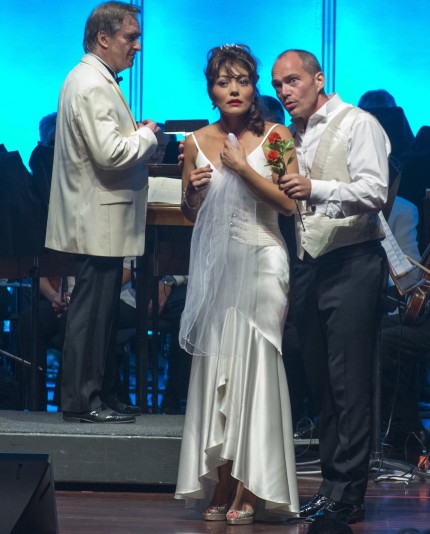Conlon restores a welcome intimacy to “Don Giovanni” at Ravinia

James Conlon has made performing Mozart operas with members of the Chicago Symphony Orchestra in the Martin Theatre a hallmark of his nine-year Ravinia Festival music directorship. (The venue is also the last of the buildings remaining from when Ravinia was known as Ravinia Opera a century ago.)
This year sees Conlon return to two of Mozart’s collaborations with Lorenzo Da Ponte that had been presented in previous years with Don Giovanni opening the cycle Thursday night.
The overture was a bit tentative but as the action of this effectively semi-staged production directed by David Lefkowich ensued, things came together more convincingly. As had been the case the last time Conlon and the CSO had presented Giovanni at the Martin in 2008, the harpsichord, played by Miah Im, was placed off to the side of the stage, which sometimes made for a bit of miscoordination with the singers.
Serbian-Israeli baritone David Bižić’s Leperello went for broad comedy over introspection. His vocal color is somewhat coarse and his diction unfocused, though his acting more than compensated.
Conversely, British baritone Christopher Maltman’s Giovanni had a smooth and confident vocal presence, but little of the charisma or devil-may-care attitude ideal for the title role. Both servant and master had good chemistry vocally and dramatically.
Soprano Tamara Wilson’s Donna Anna tended towards a shrill sound which worked well for some of the action when alarm was called for, but less effective in the tender arias. Her sense of arrogance and indignation at her plight as a seductee of Giovanni who then kills her father attempting to protect her honor, was palpable.
Albanian-Italian tenor Saimir Pirgu as Don Ottavio had the best Italian diction of the cast and a warm, Mediterranean sound to his voice. Of a cast that by and large sang too loudly for the space, Pirgu admirably reigned in his instrument as needed.
Icelandic bass Kristinn Sigmundsson’s Commendatore was not very vocally flexible during his Act I portions while he was still alive, but made a delightfully chilling ghost in the opera’s finale with his long, thunderous sustained notes.
Polish soprano Aga Mikolaj’s Donna Elvira was the most consistent of the female leads, allowing her sense of shattered self-worth and resignation to color her vocal nuances.
Baritone Jonathan Michie made a delightful Masetto and Chicago native Ailyn Pérez an effective Zerlina.
As is often the case during Chicago Symphony Orchestra summer performances at Ravinia, wind principals were noticeably absent, a signifincant loss given how paramount the wind writing is in Mozart operas.
String principals were mostly present but the sections sounded under-rehearsed, particularly in Act I and the overall orchestral sound was often lost in the balance save for an absurdly overamplified mandolin.
A small chamber choir of Chicago Symphony Chorus members was prepared for these performances by associate director Cheryl Frazes Hill, and made an effective and powerful presence, particularly the men, in the final scene.
Given how little rehearsal time there is for Conlon to pull these operas together, the results were astoundingly successful. It is always a rare treat to hear a Mozart opera in a theater similar in size to what Mozart intended rather than the cavernous venues we have become used to experiencing.
Don Giovanni will be repeated at 1 p.m. Saturday. The Marriage of Figaro opens at 7 p.m. Friday and repeats at 1 p.m. Sunday; ravinia.org; 847-266-5100.
Posted in Uncategorized




